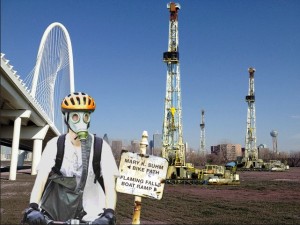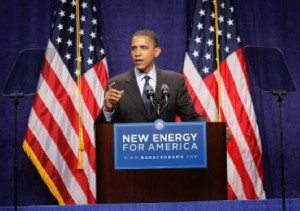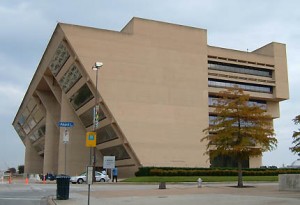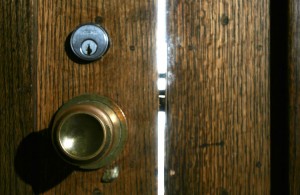Drilling in Dallas
New Studies Link Air Pollution to Cancer, Heart Failure and…Appendicitis?
 According to CBS News
According to CBS News
"A new study published July 10 in The Lancet showed that even breathing low levels of air pollution for a prolonged period of time could raise risk for the often-deadly lung disease. Another study released on the same date showed that short-term exposure to most major air pollutants could increase the risks of hospitalization and death from heart failure."
Lung cancer risks went up 18% with each increase of 5 migrograms of PM 2.5. Researchers noted that they did not find a level of pollution for where there was no risk, and the results indicated "the more the worse, the less the better" when it came to pollution.
"At this stage, we might have to add air pollution, even at current concentrations, to the list of causes of lung cancer and recognize that air pollution has large effects on public health," Takashi Yorifuji from the Okayama University Graduate School of Environmental and Life Science and Saori Kashima from Hiroshima University in Japan…."
A second study shows the risk of dying or going to the hospital because of heart failure increased by 3.52 percent for every 1 part per million increase of carbon monoxide levels; 2.36 percent for every increase of 10 parts per billion of sulfur dioxide; 1.7 percent for ever 10 parts per billion increase in nitrogen dioxide; and about 2 percent for every 10 micrograms per cubic meter increase of particulate matter. Surprisingly, increases in ozone were not linked to heart failure. Unsurprisingly, you're breahting in all of these kinds of air pollution if you live in DFW.
All of that is kind of old news – put stuff in air, see stuff harm your lungs and heart. But here's a new "adverse health effect" being linked to air pollution – appendicitis. While not as lethal as lung cancers and heart attacks, anyone who's had their appendix rupture can tell you it's not a pleasant experience.
And while ozone may not have been linked to heart problems in that previous study, the New York Times reports a Canadian one links it to a slight increase in your chances of having appendicitis.
High ozone levels were associated with an increased number of hospitalizations for appendicitis and were even more strongly associated with cases of burst appendix. For each 16 parts per billion increase in ozone concentration the scientists found an 11 to 22 percent increase in ruptured appendix cases. The study was published in Environmental Health Perspectives. The associations persisted after controlling for age, sex, season of the year and the presence of other air pollutants, like nitrogen dioxide and particulate matter. The reason for the association is unclear, but studies in mice have shown that air pollution can alter the animals’ abdominal bacteria.
Who knew?
See North Texas Gas Problems Explode on Screen! GASLAND Part II Premieres on Monday
Most of you probably are already aware that Josh Fox's follow-up to "Gasland" will be premiering on HBO Monday night. What you might not know about "Gasland II" is that it heavily features North Texas. Former DISH Mayor Calvin Tillman, Earthworks organizer Sharon Wilson, and Parker County resident Steve Lipsky are all in there, and Lipsky's fight for his well water is a major story thread.
Like it or not, the Barnett Shale is where folks from the rest of the country and the rest of the world come to see what kind of damage fracking can leave in its wake.
Hard to believe it's been 3 years since Downwinders hosted the theatrical premiere of the original in October of 2010 with Fox showing up for a panel discussion that also featured former city councilwoman Angela Hunt afterwards at the Angelica. It was the first citywide show of opposition to gas drilling in Dallas and a full year before the packed Texas Theater showing where Mayor Mike Rawlings made his now famous pledge "to never put neighborhoods at Risk over money." But that was all so pre-secret deal ago.
This summer the City Plan Commission is meeting every two weeks to draft a new gas drilling ordinance for Dallas. By late August or early September, they're expected to be finished and have said they will then hold public hearings on the draft they'll submit to the City Council for a vote. Plans are under way to try and bring Josh Fox to Dallas for a theatrical premiere of his sequel as these public hearings kick-off. Nobody's sure if this can happen with Josh himself – he's become a genuine celeb since the first time around – but we're working on producing our own "sequel" to that very successful first showing. Stay tuned.
Meanwhile, you can send a quick e-mail to the Plan Commission members telling them what you'd like to see in a new gas drilling ordinance for Dallas by clicking here.
Dallas Morning News Editorial On New Gas Ordinance
 Gets a lot of things right, but also leaves out a lot, like floodplains, air pollution, compressor stations, and full disclosure.
Gets a lot of things right, but also leaves out a lot, like floodplains, air pollution, compressor stations, and full disclosure.
The next City Plan Commission meeting on the drafting of the new ordinance is at 9 am,Thursday July 11th at Dallas City Hall in 5ES on the fifth floor. They're due to talk about operational conditions, i.e., hours, dust, noise, chemical disclosures, landscaping, monitoting an baseline testing.
Seems like a good time to mention that you can send the City Plan Commission a quick e-mail about what the new gas ordinance should contain by going to our "Featured Citizen Action of the Week."
Obama’s Speech Fracked Open
 The San Fransicso Chronicle has a take on how the Obama climate change speech jives with the reality in the country's Shale Gas fields – like the one you live in.
The San Fransicso Chronicle has a take on how the Obama climate change speech jives with the reality in the country's Shale Gas fields – like the one you live in.
Robert Howarth, a Cornell University professor who argues that methane leaks from drilling negate other climate benefits of gas, said in an email to The Associated Press that he is "extremely disappointed in the President's position" and said the support for natural gas "is very likely to do more to aggravate global change than to help solve it."
Not so, Obama said.
Advances in drilling, the president said, have "helped drive our carbon pollution to its lowest levels in nearly 20 years," and "we'll keep working with the industry to make drilling safer and cleaner, to make sure that we're not seeing methane emissions."
Despite Staff Riding Roughshod, Dallas Plan Commission EXTENDS Gas Well Setbacks to 1500 Feet
 Rebuking city attorneys, the Dallas City Plan Commission agreed on Thursday to require 1500 foot setbacks, or buffer zones from gas wells to "protected uses" such as homes, businesses, hospitals, schools, recreation areas, and parks. A waiver to get as close as 1000 feet would have to come with a three-fourths vote by the City Council. No well could be closer than 1000 feet.
Rebuking city attorneys, the Dallas City Plan Commission agreed on Thursday to require 1500 foot setbacks, or buffer zones from gas wells to "protected uses" such as homes, businesses, hospitals, schools, recreation areas, and parks. A waiver to get as close as 1000 feet would have to come with a three-fourths vote by the City Council. No well could be closer than 1000 feet.
City staff was pushing hard to retain the 2012 gas task force recommendations of 1000 feet, with a waiver to as close as 500 feet, something even the Dallas Morning News said was unacceptable. Those less-protective distances are seen as a way to get the twice-rejected Trinity East permits approved under a new ordinance.
Plan commission members also agreed to include more kinds of businesses in the protected use category, such as laundry services and vehicle pool operations, somewhat erasing the blue collar/white collar double-standard of protection sanctioned by the task force.
Left pending, and full of skullduggery potential for city attorneys, is where to begin and end that 1500 feet. Most citizens would probably go from property line to property line to ensure the entire protection of the "protected use." But city attorneys want to begin at the well bore hole itself and go to the "structure" of the protected use – not your front yard, but your front door; not the soccer field itself, but the recreation center next to it. This will be the next big battle over how to define these setbacks.
Also left pending were what, if any, exceptions for park drilling there should be in the new ordinance. Even more important to the Trinity East permits than the residential setback requirement is the current prohibition on drilling in parks. Here, city staff also was lobbying very, very hard to retain the special loophole for the Trinity East permits the task force abruptly voted to make at their very last meeting and without any public comment. Preservation of this loophole – you can drill on "unused" park land despite there being no legal definition supporting that term – means that Trinity East would have a fighting chance to come back and re-file.
Although seemingly rejecting the task force recommendations, Plan Commission members still expressed desire to carve out some kinds of exceptions for park land that was perhaps not publicly or readily accessible, but had trouble articulating the definition of "unused." Under the law, park land is park land; there is no A to F park grading system. That's why the easiest and most protetive thing to do is ban drilling from parks all together.
The devil will be in the details, but in the first real test vote for a more protective gas drilling ordinance, citizens won. And it drove city attorney Tammy Palomino crazy. As Plan Commission members got more and more independent over the course of the two-hour briefing, you expected her to start reaching for the cattle prod. After calling for a reconsideration not once, not twice, but three times after she got beat bad on the vote for the 15000 ft setback she announced that staff would return at the next meeting with a "presentation" on the 1500 foot setback. No doubt it will focus entirely on why it's a bad idea for all kinds of reasons other than it'll make it harder for Trinity East to get their permits.
Make no mistake, the City Manager's office, through staff like Palomino, is still fighting on behalf of those Trinity East permits, and the permits she expects to come after those. She's trying to minimize the number of protected uses and the spaces between them and your house, school or playground.
If you want to fight back but can't show up in person to tell the Commission what you think, please consider sending a qucik click N send e-mail message to the members via our "Featured Action of the Week."
The Plan Commission will be getting briefings from staff on different parts of the new ordinance every two weeks throughout the summer (July 11 and 25 August 8 and 22) with at least one or two public hearings on the finished product after that. All meetings begin at 9 am and are conducted at Room 5ES on the fifth floor of Dallas City Hall downtown. The next meeting is supposed to focus on the operations of a well site, i.e. hours of operation, noise, dust, plus the all-important landscaping requirements. Stay tuned.
Mike and Mary Try to Break in the Back Door for Trinity East Permits
 This went out at 12 noon today….
This went out at 12 noon today….
Mary Suhm’s Revenge:
Pretending Last 7 Months of Public Outrage Didn’t Happen,City Staff Writing New Gas Drilling Ordinance Allowing Twice-Denied Trinity East Permits To Get Approved
(Dallas)—Citing what they say is a blatant disregard for the consensus that’s formed after intense public debate, homeowner and environmental groups accused city officials of drafting a new gas drilling ordinance that would allow permitting of the same Trinity East sites that have already been voted down twice in the last seven months.
“It’s clear that Mary Suhm and Mayor Rawlings are still trying to get that Trinity East deal cut,” said Mountain Creek Neighborhood Alliance member Claudia Meyer. “Having failed to overcome citizen opposition to drilling in parks, flood plains and neighborhoods, not once, but twice, the City Manager and Mayor are now proposing an ordinance that pretends none of that opposition took place and allows drilling near where people live, work and play.”
On Thursday morning, city staff will begin to brief the City Plan Commission on the process of updating the current version of the gas drilling ordinance, passed in 2007. It will take at least several months for the commission to work through a full revision. City Attorneys are expected to rely exclusively on the 2011-2012 Dallas Gas Drilling Task Force recommendations as the basis of a new ordinance. These recommendations are now almost a year-and-a-half old and the source of growing controversy because of their suspected link to the secret deal negotiated between Suhm and Trinity East revealed publicly for the first time this year.
In its initial deliberations, the Task Force recommended a 1000-foot setback and a ban on park drilling. But then city staff briefed the Task Force, explaining how these recommendations would essentially prohibit the permitting of the pending Trinity East sites. A week later, during its final meeting, the Task Force voted to reverse the park land recommendation and weaken the setback requirement. Some Task Force members were absent, and there was no public warning or opportunity for comment. Meyer and other critics say it’s now clear that the rollback was to protect the then-still secret deal. “That’s why Dallas City Hall wants to start with the Task Force recommendations: they were re-written to make sure Trinity East got its permits.”
Coming almost a full year before the Mayor’s decision to try and push the Trinity East permits through, the final Task Force recommendations were never the subject of any public hearing. Instead, the fight over the Trinity East permits became a proxy public fight over the shape of a new Dallas ordinance, with residents winning denials in December and February. “If one thing is clear from the last seven months of debate, it’s that Dallas residents don’t want drilling in parks, flood plains or near people. But the very places that were rejected as inappropriate by the public and the City Plan Commission for the Trinity East sites are now the same ones being recommended by city staff,” said Zac Trahan of the Texas Campaign for the Environment.
To avoid depending on City Council “supermajorities” of 12 or more to overcome permit denials by the Plan Commission, Trahan predicted that Trinity East would seek a slight alteration for one its proposed sites to submit a new application under the resulting new, more permit-friendly rules. “If this kind of ordinance is passed, despite everything that’s happened over the last seven months, we expect Trinity East to seek permits to drill in Dallas parks and floodplains. That’s why we’re sounding the alarm now, at the beginning of this end-run. Residents won the first two times. Third time’s the charm.”
What: City of Dallas staff briefing to City Plan Commission on new gas drilling ordinance
When: Thursday, June 20th 9:00 a.m.
Where: Dallas City Hall 5ES
At Issue: Will the most important Dallas environmental victory in 20 years be sabotaged by City Hall?
Post Election Dallas Drilling Update – 7 For, 6 Against, 2 Wild Cards
 With the election of Philp Kingston and Rick Callihan, the new edition of the Dallas City Council is complete. The good news is that the last six months of hand-to-hand civil combat over the Trinity East gas permits seems to have paid-off in expanding the number of gas drilling opponents to at least six members
With the election of Philp Kingston and Rick Callihan, the new edition of the Dallas City Council is complete. The good news is that the last six months of hand-to-hand civil combat over the Trinity East gas permits seems to have paid-off in expanding the number of gas drilling opponents to at least six members
The bad news is that hard-core supporters still retain seven seats, with two new members hard to read given their campaign answers.
Supports Drilling
Mayor Mike Rawlings
Dwaine Caraway
Vonciel Hill
Terrell Atkins
Sheffe Kadane
Jerry Allen
Rick Callihan (new)
Opposes Drilling
Scott Griggs
Philip Kingston (new)
Sandy Greyson
Carolyn Davis
Monica Alonzo
Adam Medrano (new)
?
Lee Kleinman (new)
Kleinman's DMN questionnaire answer: "I will not take a position at this time because the issue is far to complex to evaluate in the midst of a campaign. The Task force spent 9 months on this issue and I personally know and respect a number of its members. The Council has yet to adopt its recommendations and it will take a much deeper study of the facts before I can take a formal position."
DMN campaign debate coverage: "(He didn't take) firm positions on hydraulic fracturing in Dallas, but said drilling probably shouldn’t occur around residential areas or kids’ soccer fields."
Jennifer Stabach-Gates (new)
Stabach-Gates' Dallas Real Estae News questionnaire answer: "I am opposed to fracking in neighborhoods or near public spaces. There are limited areas in Dallas where fracking would be considered, and these should be addressed on a case by case basis. But as a rule, I will always place a higher priority on protecting neighborhoods and the health of our residents."
Hard to tell when the first vote to test these categories will occur. Officially, the council has yet to take a vote on the Trinity East permits. But rumor has it that the City Plan Commission will be getting briefed by Mary Suhm's legal staff on what a new drilling ordinance should look like this coming Thursday at City Hall, so maybe we won't have to wait that long to see how much the same or different this council is from the last when it comes to the most important environmental fight in Dallas in the last 20 years.
A Fort Worth Gas Backlash at The Voting Booth?
 For the last couple of years Dallas has gotten all the headlines over gas permit fights. It's because the Barnett Shale play took its time to roll eastward while evidence was mounting about the adverse effects of fracking. There was still a large precedent to be set when the play met the new evidence in Dallas. Citizens groups with professional staffs, like Downwinders, made a stand over a new Big D drilling ordinance (still) in progress.
For the last couple of years Dallas has gotten all the headlines over gas permit fights. It's because the Barnett Shale play took its time to roll eastward while evidence was mounting about the adverse effects of fracking. There was still a large precedent to be set when the play met the new evidence in Dallas. Citizens groups with professional staffs, like Downwinders, made a stand over a new Big D drilling ordinance (still) in progress.
But whereas Dallas has been the reluctant and controversial wallflower to the gas suitors, Fort Worth has been the region's floozie, stumbling over itself to offer up all of its goodies to the highest bidder. In Cowtown, no cultural, political, or social institution has been left unaffected by the smell of gas money. Officials who were preaching about clean air and regional responsibility in the 1990's took the money and ran…right over to Chesapeake HQ. Now, fights over gas permits there are considered a kind of fifth column exercise by the rest of us. But of course, that's the way most people view being an environmentalist in Texas.
However, this last election cycle saw some signs of Fort Worth waking-up from its ten-year party. This Star-Telegram article points to opposition to a large compressor station as being a factor in the District 5 City Council run-off race there between incumbent Frank Moss and challenger Gyna Bivens. Bivens actually garnered more votes in the general election back in May.
"Bivens, who lives in Ramey Place near Dunbar High School and won her precinct by a wide margin, put up her strongest results in neighborhoods north of Interstate 30 and east of Loop 820. Those neighborhoods – new to the district in a redraw of council maps – are seeing new development and fighting attempts by the natural gas industry to place gas compressors on agriculturally zoned land in the bucolic area."
Coming out of this same neighborhood and leading the fight against that compressor is recent Tarrant Regional Water District winner Mary Kelleher, who was the only one of three challengers to win against entrenched incumbents of this usually staid entity.
As far as we can tell, these are the first successful races to spotlight gas industry problems in Fort Worth. Considering the amount of wheeling and dealing over the last decade, surely they won't be the last.
Behind Closed Doors Again
 On Wednesday the Dallas City Council met in executive session to talk gas drilling. Will there be a move to vote on the Trinity East permits before the new, slightly less drill-enamoured Council is seated on June 24th, or was this just another chance for the City Attorney to lecture members about how dire the consequences of denying these permits will be before they're joined by the rookies? Stay Tuned.
On Wednesday the Dallas City Council met in executive session to talk gas drilling. Will there be a move to vote on the Trinity East permits before the new, slightly less drill-enamoured Council is seated on June 24th, or was this just another chance for the City Attorney to lecture members about how dire the consequences of denying these permits will be before they're joined by the rookies? Stay Tuned.
How Mary Suhm Fracked Herself
 When you take on polluters, you take on the government that lets them pollute. The two are intertwined.
When you take on polluters, you take on the government that lets them pollute. The two are intertwined.
On Thursday, Dallas City Manager Mary Suhm announced that she was resigning. Just about every news account of her announcement connected it to a series of missteps over the last several years, most prominently, the February disclosure by the Dallas Observer that she had signed a previously unknown agreement with Trinity East promising to work with the company to overturn current policy and help secure permits to drill for gas in city parks.
Although superficially dealt with by an official airing in front of the Council where most members forfeited their roles as keepers of the public trust, the issue kept floating to the top of any discussion about not only the Trinity East permits, but the general issue of gas drilling in Dallas. Every City Council race questionnaire this election cycle had queries about not only the specific permits, but also about the performance of the City Manager in wrestling with the scandal. This wasn't going away.
Suhm had what she believed was a plausible public explanation for how she made an honest mistake in misleading the Council over the agreement….for five years. What was always lacking was an explanation for why she continued to lie to Dallas residents about it for that long. Not one word of any defense of her focused on why it was wrong for a city official to align herself against citizens fighting irresponsible drilling and not tell them about that alignment as the entire city went through a multi-year reassessment of urban drilling, first with a moratorium on new permits, then a gas drilling task force, then the permitting process for the Trinity East permits themselves.
instead she directed city staff to distort the system to enable illegal permits to appear legal. Zoning classifications appeared or disappeared depending on the forum. One-off exemptions were carved out as necessary. Park drilling? Perfectly fine under these "special" set of circumstances. Flood plain drilling? No problem either. Anything to make these square pegs fit in otherwise round holes.
Common decency and allegiance to democratic principles demands that she should have publicly disclosed the agreement with Trinity East the minute a review of current city drilling policy began. She did not. When it was involuntarily disclosed for her by the Observer, she looked exactly like the co-conspirator she was.
There's no question that the fight citizens' groups have waged against the Trinity East permits led directly to the disclosure of the agreement. Based solely on circumstantial evidence, it was clear that there was some kind of unpublicized deal that had been "cut" between City Hall and Trinity East. Looking for it became the political equivalent of looking for Dark Matter in the Universe. Everything happening pointed to its existence, but you couldn't actually see the thing itself.
But here's the punch line. Citizens only started to look for that deal after Suhm and the Mayor decided to fast-track the Trinity East permits in late November. It was that decision, made without any warning to the residents that had been involved in the drilling fight, and abruptly ending a year-plus long moratorium on new gas permits, that re-energized opposition and led to Suhm's resignation only six months later. Suhm fracked herself the minute she began to plot with the Mayor to undercut due process and try to pull a fast one on citizens. If they hadn't been in such a clumsy rush to get the Trinity East permits approved, none of this would have happened like it did.
Last week's municipal elections solidified a slightly more independent Dallas City Council, with new and re-elected members who openly oppose the Mayor's pro-drilling stance. Trinity East's permits, which needed a Council super-majority to be approved, look to be doomed. Rawlings' own political future is clouded – how many North Texas mayors have unpopular proposed refineries named after them? The landscape of city politics has changed over the last six months. Citizens fighting City Hall did that. But it was City Hall itself who set it in motion.
